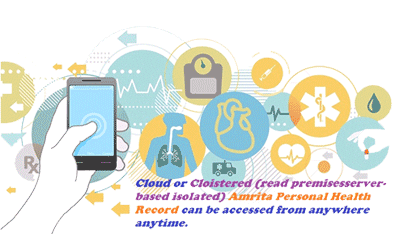Amrita Personal Health Record
Amrita Technologies, based in Kerala, India and California, US has developed the Amrita Personal Health Record system in compliance with the Blue Button and the Health Level 7 (HL7) international standards. Amrita Technologies created one of the first fully integrated, completely web and cloud based Hospital Information Systems in India in 2002. Amrita HIS is certified through Meaningful Use 2, CCHIT, ARRA and Surescripts – one of only 4 vendors in 2011 to obtain the coveted CCHIT. Amrita HIS is deployed in over 30 major hospitals across India and the United States. APHR is an individual's personal health record maintained over his/her lifetime.A comprehensive health record, the APHR will maintain all medications, surgeries, case notes, OP and IP visits, lab results, radiology images, etc for a lifetime. Patients will be able to access their records anytime, anywhere, especially in emergencies.
